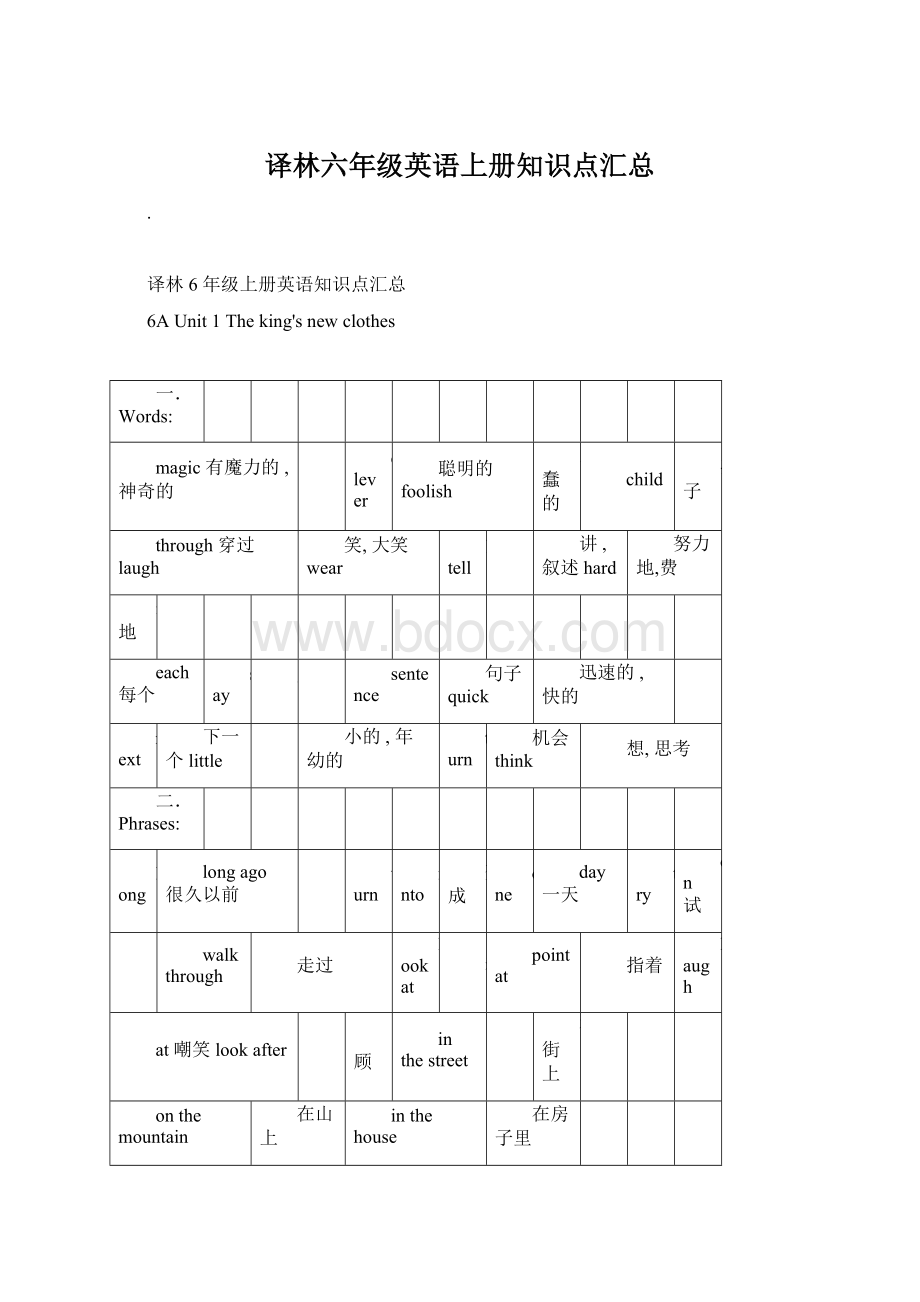译林六年级英语上册知识点汇总.docx
《译林六年级英语上册知识点汇总.docx》由会员分享,可在线阅读,更多相关《译林六年级英语上册知识点汇总.docx(32页珍藏版)》请在冰豆网上搜索。

译林六年级英语上册知识点汇总
.
译林6年级上册英语知识点汇总
6AUnit1Theking'snewclothes
一.Words:
magic有魔力的,神奇的
clever
聪明的foolish
愚蠢的
child
孩子
through穿过laugh
笑,大笑wear
穿tell
讲,叙述hard
努力地,费
劲地
each每个
say
说
sentence
句子quick
迅速的,快的
next
下一个little
小的,年幼的
turn
机会think
想,思考
二.Phrases:
long
longago很久以前
turn
into
变成
one
day一天
try
on试
穿
walkthrough
走过
lookat
看
pointat
指着
laugh
at嘲笑lookafter
照顾
inthestreet
在街上
onthemountain
在山上
inthehouse
在房子里
intheforest
在森林里
makenewclothes
做新衣服
三.Sentences:
1.Longlongago,therewasaking.
很久以前,有一个皇帝。
2.Oneday,twomenvisitedtheking.
一天,两个男人拜访了皇帝。
3.Thekingwashappy.
皇帝很高兴。
4.Whatbeautifulclothes!
多么漂亮的衣服啊!
5.Thetwomenshowedthekinghisnewclothes.
那两个男人给皇帝展示了他的新衣服。
.
.
6.MissFoxandherstudentsareplayingagame.
狐狸老师正在和她的学生们玩游戏。
四.Grammer:
1.概念
在过去某个时间里发生的动作或存在的状态:
过去习惯性或经常性的动作、行为。
2.时间状语
ago,yesterday,thedaybeforeyesterday,last
week(year,night,month⋯),in1989,justnow,longlongago,onceuponatime.
3.肯定句
主语+行为动词(过去式)+其他。
例如:
Iwasbornin1998.我在1998年出生。
Mygrandfatherdiedlastyear.我(外)祖父去年去世了。
4.否定句:
主语+didn’t+行为动词(原形)+其他。
例如:
Hedidn’tdohishomeworkyesterday.他昨天没有做他的家庭作业。
Ididn’tknowyouwerehere.我不知道你在这儿。
6.一般疑问句
Did+主语+行为动词(原形)+其他?
肯定回答:
Yes,主语+did.
否定回答:
No,主语+didn’t.
例如:
---Didyougotothezoolastweek?
你上周去动物园了吗?
---Yes,Idid.是的,我去了。
7.动词过去式的规则变化和一些不规则变化
.
.
构成方法:
1)一般在动词词尾直接加-ed.help-helped,clean-cleaned,visit-visited,show-showed,walk-walked,look-looked,shout-shouted,point-pointed
2)以不发音的字母e结尾的动词,在词尾直接加-d.live-lived,move-moved,like-liked,
3)以辅音字母加y结尾的动词,变y为i,再加-ed.study-studied,cry-cried
4)以一个元音字母加一个辅音字母结尾的重读闭音节动词,先双写末尾的辅音
字母,再加-ed.plan-planned,stop-stopped
不规则变化(特殊记忆):
am/is-was,are-were,go-went,meet-met,see-saw,do-did,get-got,
read-read
6AUnit2Whataday!
一.单词:
sunny晴朗的
show
展览,展示
interesting
有趣的,有意思的
weather
天气
become
变成,成为
windy
有风的
honey
蜂蜜
cloudy多云的
high
在高处
drink
饮料
ant
蚂蚁
bee蜜蜂
cloud
云
rain
下雨
rainy
多雨的
meet遇见
lose
丢失
know
知道
二.短语:
inthemoring/afternoon在上午/下flykiteshigh放风筝放的
高
gototheparkbybike骑自行车去公园aparrotshow鹦鹉展览
.
.
someinterestingparrots
一些有趣的鹦鹉
someants
一些蚂蚁
becomewindyandcloudy变得既有风又有云
inthesky
在空中
bringsomedumplings带一些饺子
blackclouds
乌云
hungryandwet
又饿又潮湿
theNewYear
新年
losemynewkite
丢失了我的新风筝
flyhigh
飞得高
nearthehill在小山附近climbupthehill爬上小山
holdonto抓紧flyaway飞走
goswimming去游泳watchafilm看电影
haveapicnic野餐dothehousework做家务
looksad看起来伤心cheertogether一起庆祝
三.重要句型
A.Itwassunnyinthemorning.早上天气晴朗。
B.Whathappened?
发生了什么事?
C.What’sthematter?
怎么了?
(询问身体状况)
D.Wesawmanyinterestingparrots.我们看见了许多有趣的鹦鹉。
E.Butitwasn’twindyinthepark.但是公园里没有风。
F.Whataday!
真是多变的一天!
G.Welldone!
做得好!
四.语法点:
1.表示天气的形容词warmcoolhotcool
sunnywindycloudyrainysnowy
2.形容词的用法:
3.形容词可以修饰名词,一般放在名词的前面。
.
.
如:
It’sasunnymorning.是一个晴朗的上午。
4.形容词用于系动词(be,get,look)的后面,用来说明主语的特征。
如:
Itwasrainyyesterday.昨天是个下雨天。
5.形容词可以和副词连用,由于副词的强调作用,所表达的意思更深一层
如:
Thejacketistoosmallforme.这件夹克衫对我来说太小了。
2.描述过去天气的句型-------Itwas+表示天气的形容词+其他。
Eg:
Itwassunnyinthemorning.早上天气晴朗。
在描述天气时,我们可以用it来代指天气。
因为描述的是过去的天气,所以be
动词用was,后面接表示天气的形容词。
Eg:
ItwascoldinChangchunlastwinter.去年冬天长春很冷。
3.动词过去式的不规则变化
fly—flew,
grow--
grew,
draw--drew,
sing--
sang,
drink--
drank,
give--
gave,
sit
--sat,
begin
--began,
swim--
swam,
run--
ran,
get--
got,
forget--forgot,
read--
read,
put--
put,
write---
wrote,
is/am--
was,
are--
were,
do/does--did,
have/has--
had,
eat--
ate,
go--went,
make--
made,
see--saw,
tell
--told,
take--
took,
buy--
bought,
catch--caught,
teach—tought
find--
found,
hear--
heard,
.
.
meet--met,say--said,sleep--slept,sweep--swept,
stand--stood,
steal--stole,think--thought,will--would,speak--spoke,
feel--felt,
come--came
4.1)be动词的过去时的肯定句式,结构为:
主语+was/were+其他。
Eg:
ThegirlwasinthezoolastSunday.那个女孩上个星期天在动物园。
Thereweresomebananasonthetablethismorning.今天早上桌子上有一
些香蕉。
2)be动词的过去时的一般疑问句式,结构为:
was/were+主语+其他+?
Eg:
WasthegirlinthezoolastSunday?
那个女孩上个星期天在动物园吗?
Werethereanybananasonthetablethismorning?
今天早上桌子上有一些香蕉吗?
3)be动词的过去时的否定句式,结构为:
主语+was/were+not+其他。
Eg:
Thegirlwasn’tinthezoolastSunday.那个女孩上个星期天没在动
物园。
Thereweren’tanybananasonthetablethismorning.
今天早上桌子上没有一些香蕉。
6.实义动词的过去时的肯定句式,结构为:
主语+动词的过去式+其他。
Eg:
Wesawmanyinterestingparrots.我们看见了许多有趣的鹦鹉。
Wewateredflowersthismorning.我们今天早上浇花了。
Heclimbedthemountainsyesterday.他昨天爬山了。
6AUnit3Holidayfun
.
.
1.
单词:
Holiday假期call
打电话
excited(
某人)感到兴奋的
interesting
(某事或某物)有趣的paper
纸ask
问
star
星星
Bund
外滩
bottle
瓶子
2.短语:
comebacktoschool
回到学校
NationalDay
国庆节
visithisaunt
探望他的阿姨
gototheBund
去外滩
visittheShanghaiMuseum
参观上海博物馆
greatfun
十分有趣
manyinterestingthings
许多有趣的事物
gotothefarm
去农场
picksomeoranges
摘橙子
gofishing
去钓鱼
catchabigfish
捉了一条大鱼
livein
居住在
GreatWall
长城
PalaceMuseum
故宫
SummerPalace颐和园
Tian
’anmenSquare天安门广场
theEasterholiday
复活节假期
theSummerholiday
暑假
theChristmasholiday
圣诞假期
comehomelate
回家晚了
gowell
进展顺利
fashionshow
时装秀
atfirst
起初heavyrain
大雨
惯用表达:
1.That
’scool.
那很酷。
2.Oh,that
’stoobad!
哦,那太糟
糕了!
3.Whatgreatfun!
多么有趣!
4.wanttodosth=wouldliketodosth
想要去做某事
5.call+
人称宾格(me/him/her/you/us/them
)打电话给⋯⋯.
.
.
6.人称+beexcitedabout+事物表示某人对⋯⋯感到兴奋。
3.动词过去时:
规则变化:
call-calledvisit-visitedpick-pickedwant-wanted
不规则变化:
come–camedo–didbe–was/werego–wentsee–saw
catch–caughteat–atewear–woreget–gotdidnot=
didn’t
4.句型:
1)Whatdidyoudofortheholiday?
你假期都做了些什么?
IvisitedtheShanghaiMuseum.我参观了上海博物馆。
2)Wheredidyougofortheholiday?
假期你去了哪里?
IwenttoShanghaiandvisitedmyaunt.我去上海探访了我的阿姨。
3)Wheredidhegofortheholiday?
他假期去了哪里?
Hewenttoafarm.他去了农场。
4)Whatdidyoudothere?
你们在那边都做了些什么?
WewenttotheBund.我们去了外滩。
5)Howwasyourholiday?
你的假期过得怎么样?
Itwasgreatfun.十分有趣。
6)Didyougofishing?
你去钓鱼了吗?
Yes,Idid./No,Ididn’t.
7)Whydidyoucallme?
你为什么打我电话?
BecauseIwantedtogiveyouthefish。
因为我想把鱼给你。
5.语法(含实意动词的一般过去式四种句式)
.
.
A.肯定句:
主语+动词的过去式+其他
Iplayedfootballintheparkyesterday.
2)否定句:
主语+助动词(didn’t)+动词原形+其他
Theboydidn’tflyakitelastweek.
3)一般疑问句:
助动词(Did)+主语+动词原形+其他
DidyouwatchTVathomelastnight?
4)特殊疑问句:
特殊疑问词+助动词(did)+主语+其他Wheredidyougoyesterday?
Whatdidhedothere?
6AUnit4Thenandnow
一单词:
ago以前
use
使用telephone
电话
office
办公室
anywhere到处随处
radio
收音机
newspaper
报纸
news
新闻
watch观看(动词)e-book
电子书
TV电视
still
仍然
spell拼写,拼读
with
用(介词)yesterday
昨天
二短语:
thenandnow过去和现在
makefriends
交朋友
makeasentence造句子
write
letters
to
...写信给。
。
。
writeemails
写电子邮件
listentotheradio
听收音机
tallovertheworld
全世界
buythingsfromshop
从。
。
。
买东
西
doshopping
购物
callpeopleanywhere
到处打电话给人们
lookoutof...
向。
。
。
外看
readnewspaperfornews
看报纸获得新
闻
.
.
makeasentence造句
ane-book
一本电子书
anewspaper
一张报纸
amobilephone
一部手机
atelephone
一部电话usethetelephonetocallpeople
用手机打电话给某
人
aradio
一台收音机
waitfor
等待goon
继续
intheoffice
在办公室
ontheInternet
在网上
athome在家
getangry
变得生气
三动词过去时:
1)am/is--wasare--were
can--could
能,会
get--got
取得,获
得
2)do--
did做go--went
去eat--ate
吃
see--saw
看见
3)fly--
flew
飞take--took
拿走read--
read
读
write--
wrote
写
4)use--used
使用listen--listened
听buy--bought
买
四句子:
1)Sixyearsago,Mikecouldreadanddraw,buthecouldnotwrite.
六年前麦克能够读书画画,但他不能写字。
2)--Whatdayisittoday?
今天星期几?
--It'sWednesday.星期三
3)Whatdateisittoday?
今天几号?
It's8thJuly.是七月八号。
4)Canyouspellit?
你会拼写它吗?
YesIcan.NoIcan't.
五语法:
1)主语+could/couldn't+动词原形+其他:
某人过去能做某事/不能做某事
2)Canyou+动词原形:
你能。
。
。
。
。
。
?
onMonday/Tuesday/Wednesday/Thursday/Friday/Saturday/Sunday
.
.
6AUnit5Signs
一.Words:
sign标识
careful
小心,当心
mean意思是
floor
地面
litter
乱扔垃圾
restaurant
饭店,餐厅someone
某人smell
闻到
smoke吸烟,抽烟
outing
外出游玩,远足
around
在⋯周围
二.Phrases:
shoppingcentre
购物中心
goin
进入,走进
take⋯into
带入
walkon
继续走路
三.Sentences:
1.
---Whatdoesitmean?
它是什么意思?
---Itmeanstheflooriswet.
它的意思是小心地滑。
2.
Noeatingordrinking.
请勿饮食。
3.Nolittering.
请勿乱丢
垃圾。
4.
Noparking.
请勿停车。
5.Nosmoking.
请勿吸烟。